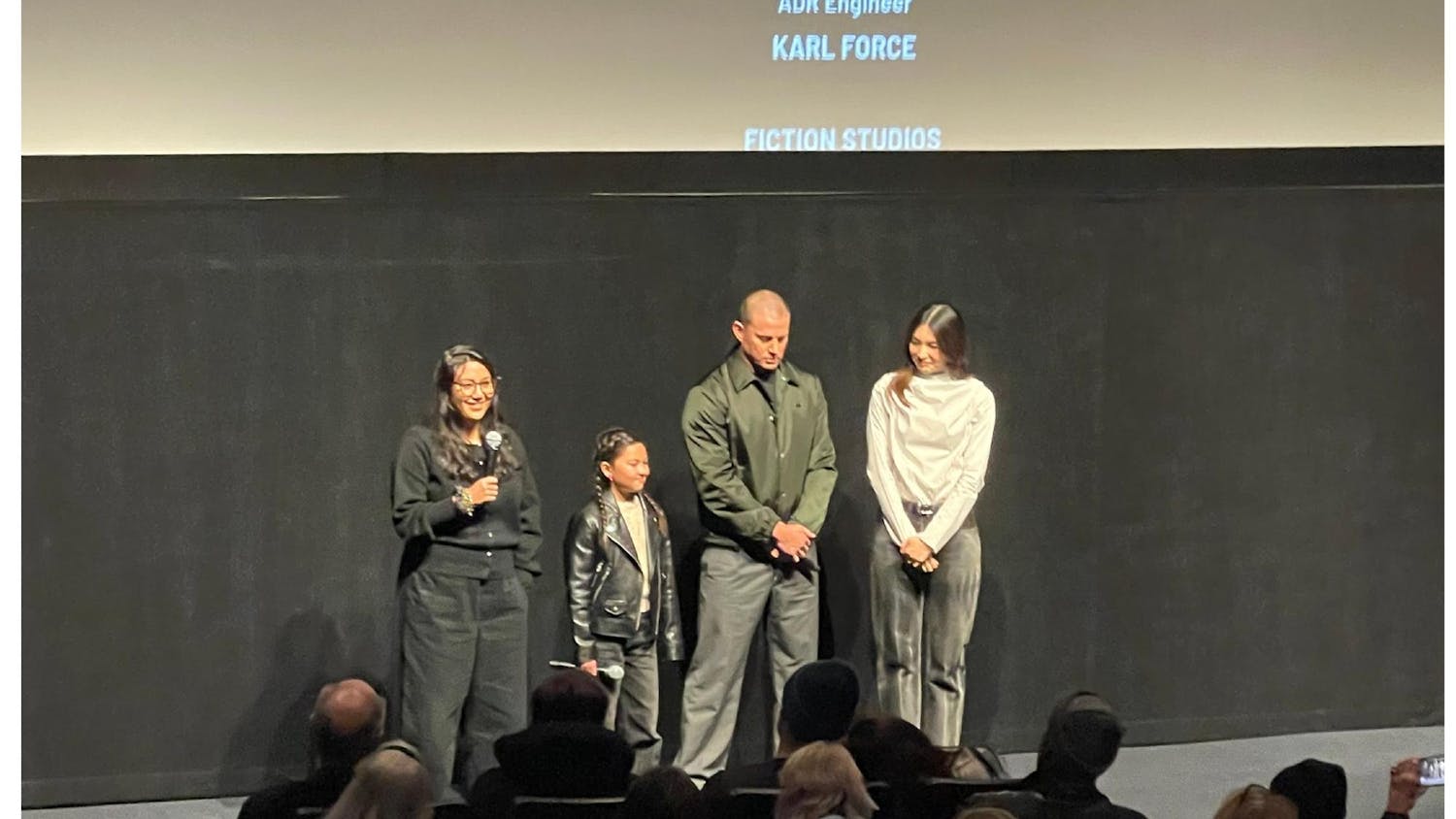 Image source: courtesy of Whisk
Image source: courtesy of Whisk
While the University of Notre Dame is famously known for its football team, there are a lot of hidden gems on campus that even students don’t know about. But today, I’m not going to talk about the University’s secret chapter of the Dead Poet’s Society or the mysterious Club Hes. I’m talking about Our Lady’s very own indie band: Whisk.
Who is Whisk?
Nathan Esser is Whisk’s lead singer and rhythm guitarist. He’s been singing for forever (basically) and spent a lot of time honing his craft through theater productions in school. He’s a musical Renaissance man and dabbles in bass and piano. He grew up listening to popular alternative bands like U2, Coldplay and the Killers but has gotten into more “niche” music since joining the band. Esser is a second-year architecture major, splitting his time between the architecture and music studios on campus.Joe Lohman is Whisk’s lead guitarist. He got his first electric guitar on his 8th birthday, and he’s been playing ever since. He’s a huge fan of 1990s and early 2000s pop punk bands like Green Day and Weezer. When he isn’t spending his second year at Notre Dame studying civil engineering or practicing in the Dunne chapel, he’s fundraising for the band via his diverse stock portfolio.
Tristan Galeon is Whisk’s keyboardist. As a classically trained pianist, Galeon is interested in branching out into new musical genres. He’s a big fan of jazz funk fusion bands like Fox Capture Plan and Snarky Puppy. Most importantly, he appreciates the chance to play music with his friends and the opportunity to play fun music. Galeon is a sophomore studying neuroscience and music.
Danny O’Brien is Whisk’s bassist. He writes most of Whisk’s original song lyrics and doubles as the band’s stand-in manager. He’s been playing bass since his sophomore year of high school. The first song he ever learned on bass was “Island in the Sun” by Weezer, but he has grown to like Peach Pit, Breakup Shoes and Vulfpeck. He is the treasurer of the Notre Dame Glee Club and studies philosophy, theology and classics. Unlike Lohman, O’Brien is not into stocks.
Will Peeler is Whisk’s drummer. He was recruited by the rest of the band after a tip about “the ginger in Glee Club” and is the only first-year in the band. He’s essentially an expert on all things percussion (and a whole variety of other instruments), ranging from African-style drumming to generic drum sets. Similar to his diverse musical background, his musical influences are all over the place, ranging from jazz drummer Brian Blade, Korn, Billy Joel to a begrudging love for All Time Low. Since his physics homework keeps him up late, he loves all types of caffeinated drinks but has a particular affinity for Vietnamese tea.

Band members Will Peeler, Tristan Galeon, Nathan Esser, Danny O'Brien and Joe Lohman pose for a picture after their performance at Acousticafé in the fall of 2021.
Image source: courtesy of Whisk
Immaculate Conception
“Right from the start, we had the idea that we wanted to actually have a band,” O’Brien said.Although Whisk started as casual jam sessions between friends, the band already had a solid group of talented musicians. O’Brien, Esser and Galeon, who all happened to live in the same section of Dunne Hall, were all experienced in their respective instruments. Esser introduced Lohman, another Dunne resident, to the band early on as a lead guitarist. The band was essentially fleshed out but lacked a full-time drummer.
In the fall of 2021, they immediately signed up for Acousticafé, a live performance opportunity hosted by the Student Union Board. Their first gig consisted of some Dua Lipa songs, “Watermelon Sugar” by Harry Styles and “Seven Nation Army” by the White Stripes.
“We were playing all sorts of weird things, but not really rock at that point. [We played] some pop stuff, some funk stuff,” O’Brien explained. “We didn’t even have a name until after the first gig, but we really came into our full form once Will joined the group and we had a committed drummer who was wicked on the kit.”
O’Brien and Esser grabbed him because they heard about him from O’Brien’s brother, Peeler said. After tracking Peeler down, he sat in with Whisk for a few practice sessions and eventually decided to join the band full-time. Peeler also happens to live in Dunne with the rest of his bandmates.
Peeler remarked about how convenient it is to practice in the Dunne chapel. “There are other groups that are trying to get me to sit in and drum with them for a while and scheduling never works because people are living everywhere,” Peeler said. “The fact that we all just have to go down to the chapel, I think, is probably the biggest reason we can be as strong as we are.”
The chapel practice space was unofficially granted to them by Dunne’s rector Fr. Eric J. Schimmel after they scored a $4,000 drum set for only $900, Peeler explained. The band put the set in the chapel to replace the worship band’s electronic drum kit — which pleased Fr. Schimmel, they said.
Lohman is astounded by the fact that they all live and practice in the same dorm. “It just makes me think of something extraterrestrial, like this is happening for a reason,” he said. “This is like destiny, you know? This is it.”
Even the band name came from a mysteriously simple moment. I was cooking one day and it just came to me, Galeon joked.
“I think it was a divine revelation,” O’Brien said.
[embed]https://youtu.be/-ydYy5BDuHk[/embed]
921 N Hill Street
I think Justin’s documentary on the band’s first off-campus performance speaks for itself.I had dragged my poor roommate and some friends to the show last Friday after I had seen the address dropped on their Instagram @whisktheband. I had heard whispers about Whisk over meals at North Dining Hall and wanted to check them out for myself.
I’ve been to house shows before with my high school’s cover band Scuse (parody of Muse), but Whisk was leagues ahead. They cranked their music up in the well-furnished basement and ended up shaking the whole house. It’s safe to say that I enjoyed myself. “Today made my list of top ten college nights,” my roommate said afterward. “Maybe even top three concerts.”
When I escaped the sweltering basement and into the cold Indiana air, I greeted some co-workers from the newspaper and friends with good music taste. On the sidewalk, people with shaved heads and leather jackets were bumming cigarettes from each other and chatting.
I thought to myself: This is it. This is Notre Dame’s scene. This is where I need to be.
[embed]https://open.spotify.com/playlist/62qvffiNJwsAm7x3KfP8Rt?si=09d1abcc04914869[/embed]
Taking Creative Whisks
“You can’t be innovative unless you know who you’re innovating from,” O’Brien said.Since Whisk is comprised of musicians from drastically different backgrounds, they’ve found their sound through covering other bands.
“The style of The Strokes and the Arctic Monkeys is a perfect middle ground for the lighter nature of bands like Coldplay and the harder nature of bands like Greenday,” O’Brien said. “It’s a nice fusion of that.”
Clearly, the band has found inspiration from its predecessors and idols. They clearly emulate the energetic stage presence of Julian Casablancas of The Strokes and Alex Turner of the Arctic Monkeys. During their concert last Friday, the band would interact with the crowd. Lohman often got in the faces of friends and strummed his Stratocaster from atop a speaker. We really like bands that don’t take themselves too seriously, Lohman said.
Esser and O’Brien in particular were inspired by The Backseat Lovers’ performance in concert. “When the lead guitarist is playing, he puts so much emotion into it,” Esser said. “He was just running around the stage and banging his head. We definitely take a lot of inspiration from them, not just in music, but how they act as a whole.”
In the songwriting process, O’Brien and Esser take most of their inspiration from The Strokes. The complex arrangement of The Strokes songs challenges us to draw on our other musical backgrounds too, Esser said. “If you take a look at the actual chords, it’s nothing complicated. It’s just the way they interact with each other.”
This is why the band appreciates their keyboardist Galeon so much. He fills any of the parts we’re missing or adds extra layers whether it’s one note over and over again or sweeping synth sounds, O’Brien said. “It creates a fuller sound for people in the audience,” Lohman said. “You really get another dimension.” Galeon, who was quiet for most of the interview, nodded and smiled humbly.
Esser’s approach to songwriting is also inspired by his architecture education at Notre Dame — specifically the standard practice called “precedent studies,” where architects look at previous buildings, take components of them and mesh them together into one building. According to Esser, this technique is highly desirable from architecture employers but has also really helped the band in its creative process. “We take five or six songs that we really like and then take little elements from each and mesh them together to make new sounds,” Esser explained.
The band’s first original single, “680,” is a new take on the classic summer fling because it’s also compounded with the difficulties of long-distance relationships in college. Their newest song, “Plastic Devil’s Horns,” was written by O’Brien in a stream-of-conscious GarageBand session at 3 a.m. It’s about the progression of a night with a bittersweet ending. Here’s a sample of their original lyrics:

What’s Cookin’, Good Lookin’?
The band is sitting on a lot of ideas for original music that they plan to polish up soon. They claim they’ve been writing original songs for over a year, but this semester is their first time playing their own stuff in front of a live audience.Whisk is in the midst of producing their originals with student producer Fabrice Uwihirwe in the Debartolo Performing Arts Center (DPAC), but they’re having difficulty capturing a sound that feels authentic.
“You can feel the energy when we play [our songs] live and we want to replicate that,” Esser said. “In the studio, we’re just not getting that.”
Part of their charm during their live performances is their raw and grungy energy. In the studio, it sounds overproduced, they said.
They don’t blame Uwihirwe for the recording issues, though: “At this point, it’s more of an equipment issue than a skills issue,” Peeler explained. The electronic drum kit in the DPAC studio sounds soulless, he said.
Their mentors in the Film, Television and Theater department talked to them about the importance of playing gigs. We want to build a natural fan base, Esser said. “When we eventually record our originals and put our stuff on Spotify, we’ll already have an audience that likes our stuff.”
In the beginning, the band was having difficulty getting gigs. They even performed at a silent auction. “Don’t even ask how that happened,” O’Brien joked. “It was sort of feast or famine.”
We’re experiencing a snowball effect, Lohman said. It’s been getting harder for the band to keep up in addition to their school work. O’Brien schedules most of their gigs, which Whisk keeps track of in a Google Calendar and iMessage group chat. “It’s the least professional thing about us,” Peeler joked.
Although the band’s future remains uncertain, Whisk is excited to play more frequently at local gigs. They plan on performing at Corby’s Irish Pub on the 7th and the Notre Dame Boogaloo at Legends on the 14th. They even have their own band merch now, which Lohman dubbed “Löded Diper chic.” With the current trajectory of the band, I know they won’t stay a secret for much longer.

Image source: courtesy of Whisk









